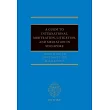A history of the people from Rotuma Island (Fiji) from legendary times (based on oral history, archaeological, and linguistic evidence), through the era of British colonial domination, until the end of the twentieth century.
The book is divided into four sections. The first section presents information about Rotuma's geography; its early history as derived from myths, legends, language affinities, and the limited archaeological work done on the island; the nature of Rotuma's culture and society at the time of European intrusion in the early nineteenth century; and the forms of creative and artistic expression.
The second section deals with the impact of explorers, whalers, beachcombers, and returning Rotuman sailors, as well as missionaries who visited or stayed on Rotuma for varying lengths of time. The time period covered by this section is from 1791, when the Pandora, captained by Edward Edwards, made a brief visit, to 1879, when a war between Methodist and Catholic factions culminated in an offer of cession to Great Britain.
Section three provides an account of Rotuma's colonial experience, beginning with the events leading to cession; the shape of political and economic experience under colonial rule; and the health and welfare implications of colonial policies.
The final section covers the Rotuman experience from the time Fiji gained independence from Great Britain in 1970 until the end of the twentieth century. This section begins with an account of changes on the island of Rotuma, followed by a consideration of the somewhat problematic relationship between Rotuma and Fiji, concluding with a look at the global Rotuman community - a community in the process offormation.



 天天爆殺
天天爆殺  今日66折
今日66折 

























 博客來
博客來 博客來
博客來 博客來
博客來 博客來
博客來 博客來
博客來